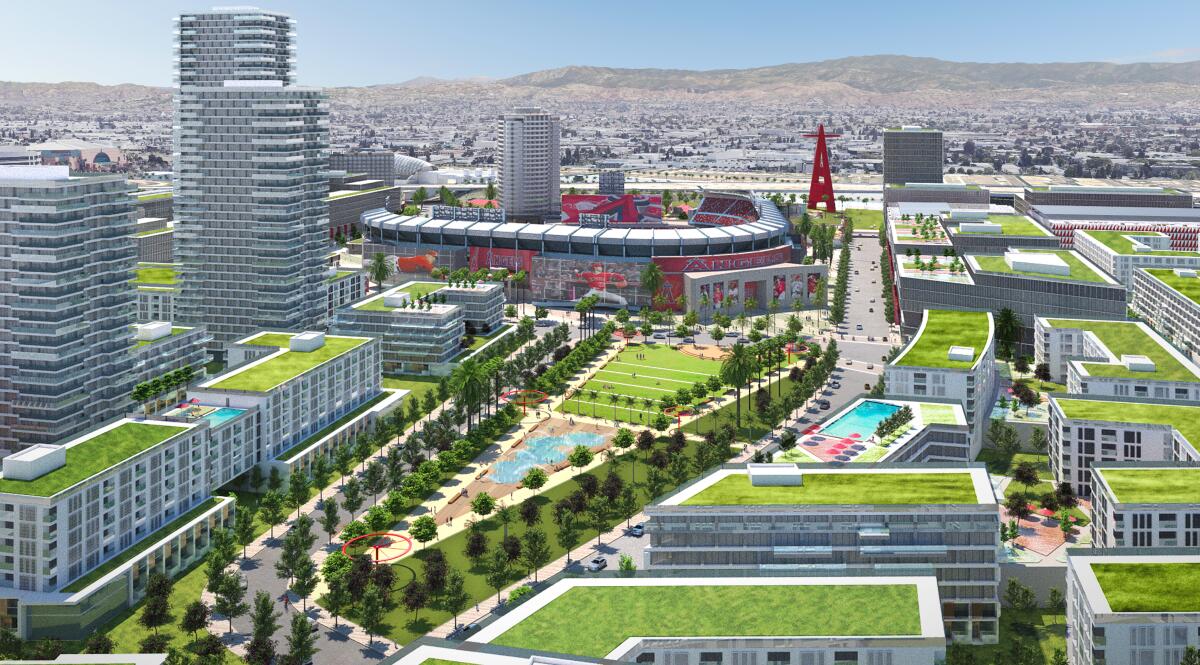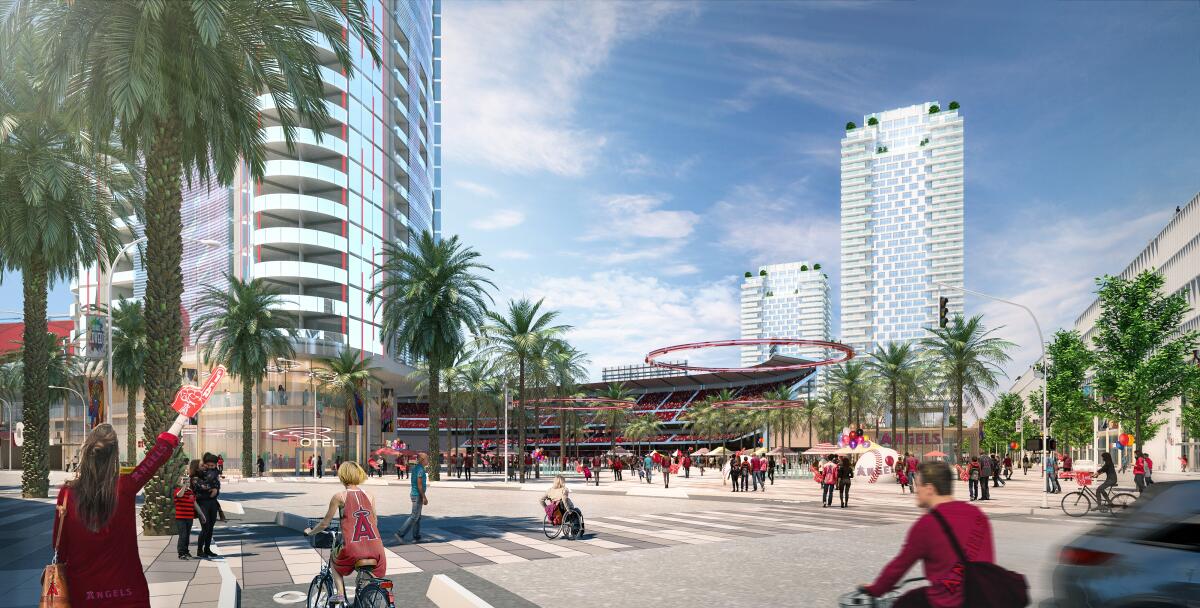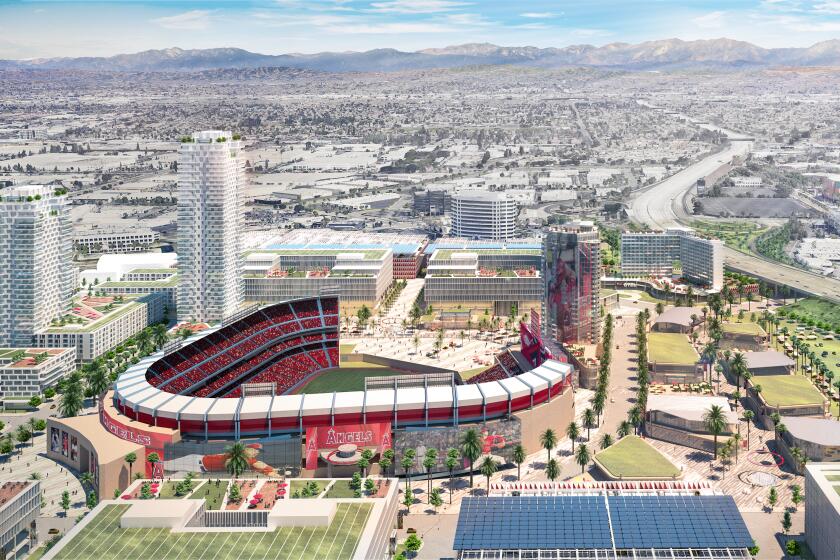Angel Stadium land sale could mean more affordable housing in Anaheim but maybe less on site

- Share via
The scorecard for the settlement in the Angel Stadium land sale: more affordable housing in the city of Anaheim, and perhaps less affordable housing at the stadium site.
The city had agreed to provide Angels owner Arte Moreno and his development company with $124 million in credits to include 466 units of affordable housing within a neighborhood to be built on the Angel Stadium parking lots. In order to resolve the city’s violation of the state affordable housing law, the city, state and Moreno agreed to use $96 million of that money toward the construction of about 1,000 units of affordable housing elsewhere in Anaheim.
The $96 million must be used within five years. In a news conference Monday, Anaheim Mayor Harry Sidhu and California Atty. Gen. Rob Bonta hailed the agreement as a path toward building more housing in less time.
The city of Anaheim and the state housing agency have reached a settlement, opening the door for the Angel Stadium land sale to be finalized.
“We will not have to wait on development at the stadium, or work around baseball seasons,” Sidhu said. “This agreement means working families will see housing they can afford sooner.”
If the state had sued to enforce the violation or the city had sued to contest it, Bonta said, the next few years could have been spent on litigation instead of housing construction.
“We are in a housing affordability and availability crisis of epic proportions,” Bonta said.
The Anaheim City Council is expected to ratify the agreement Tuesday, after which the city and state plan to submit it to a court for final approval. That approval would allow Moreno and the city to clear the final hurdle in implementing a three-year-old deal to keep the Angels in Anaheim through at least 2050 and generate tax revenue for the city by turning the largely vacant 150-acre site into a village of homes, shops, restaurants, offices and hotels.
The $96 million represents the amount of the fine for which Anaheim was liable under state law: 30% of the $320-million sale price. Under the agreement, that amount would be put into an affordable housing fund, and the city’s general fund — from where libraries, parks, police and fire services are funded — would not be affected. The city also would retain its $150 million cash proceeds from the sale price.
The development credits essentially are a rebate of a portion of the sale price.
Moreno would retain the other $28 million in credits. It is uncertain how many affordable housing units his company would build with $28 million in credits, as opposed to $124 million in credits.

The city and state, however, intend to pursue additional funding to maximize the number of units built on and off the Angel Stadium site. In a statement, Bonta’s office said the city had committed to allow the Angels to leverage “development incentives and public financing” to build “up to 466 affordable housing units on the Angel Stadium property.”
The proposed court order stipulates that “the actual number of units to be developed shall not be binding.”
In a statement, state housing agency director Gustavo Velasquez said he hoped that the $28 million in credits could be “leveraged with state and federal dollars.” He also said he hoped the $96 million could be “leveraged with other sources” to build “homes for thousands of families” elsewhere in Anaheim.
Said Bonta: “This is a huge win for the people of Anaheim.”
City Councilman Jose Moreno, who opposed the land sale, disagreed with that characterization.
“This does very little to benefit the people of Anaheim,” Jose Moreno said, “and it furthers the concerns I have heard that, ultimately, the business of the people is done privately.”
Although state law requires a council meeting agenda to be made public at least 72 hours in advance, Anaheim has called a “special meeting” Tuesday to ratify the agreement, in addition to the regular meeting. Under state law, a “special meeting” — limited to a single subject — can be made public 24 hours in advance.
Angels outfielder Jo Adell was thrown in the lineup 90 minutes before first pitch against the Orioles and he delivered, writes columnist Helene Elliott.
Jose Moreno expressed concern about focusing the expansion of affordable housing elsewhere in Anaheim, rather than on further integrating those families into the Angel Stadium area, where the Angels and Ducks are planning entertainment centers around sports venues, in the city’s so-called “Platinum Triangle” area in which luxury housing is plentiful.
“The way we are increasing our affordable housing in Anaheim is by further segregating them in the most overcrowded areas of our city,” Jose Moreno said.
The California Department of Housing and Community Development found the city in violation of the Surplus Land Act, which calls for public land put up for sale to first be offered to affordable housing developers. The city insisted it had not violated the law, claiming the land should not be considered surplus since the Angels are playing on it and noting that 15% of the housing units in the development plan would have been classified as affordable.
The city and the Angels had lobbied lawmakers in the hope they might introduce a bill to exempt the Angel Stadium project from the act, but the legislators representing the Angel Stadium area had objected to the terms of the land sale.
Assemblyman Tom Daly (D-Anaheim), one of those legislators and a former Anaheim mayor, said he was concerned over the prospect that Moreno might leverage the settlement to make more money off development.
“A bad deal has become worse,” Daly said.
The city of Anaheim and the state housing agency have reached a settlement, opening the door for the Angel Stadium land sale to be finalized.
Sen. Tom Umberg, another of those lawmakers, said he intended to introduce legislation to prevent future violations of the Surplus Land Act from being resolved this way.
“A government entity can’t agree with a private stakeholder to give them a sweetheart deal, to the detriment of the taxpayers and to the detriment of those who need housing,” he said.
The city now says it hopes the Angel Stadium land sale, originally approved in 2019, can close by year’s end. Arte Moreno’s company has 30 years to build out the site, including the parking structures that would replace the parking lots used for development. The decision about whether to renovate the current stadium or build a new one is up to Moreno.
More to Read
Go beyond the scoreboard
Get the latest on L.A.'s teams in the daily Sports Report newsletter.
You may occasionally receive promotional content from the Los Angeles Times.









